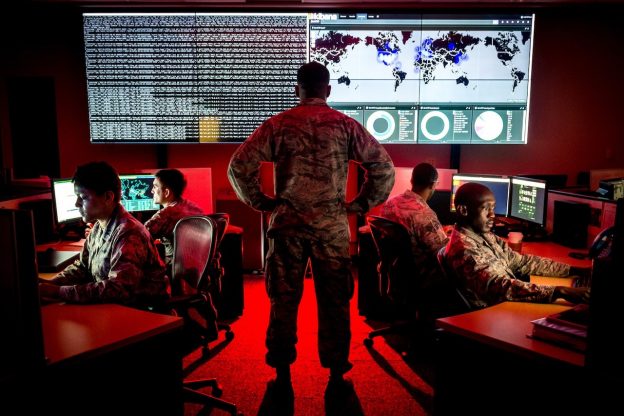Just as airplanes and tanks transformed war in the 20th Century, the employment of Cyberspace for military and espionage missions is changing the nature of international battles in the 21st. Russia, China, Iran, and North Korea invest in military capabilities that reduce America’s competitive advantages and compromise national security. Some of these states have demonstrated the resolve, technical capability, and persistence to undertake strategic cyberspace campaigns, including theft of intellectual property and personally identifiable information that are vital to our defenses. Disruptive technologies will eventually accelerate our adversaries’ ability to impose costs.
As the November general election approaches, the U.S. Cyber Command and the National Security Agency are concerned about foreign manipulation.
“We’re looking at the spectrum of all of our adversaries, Russia, China, Iran, and ransomware actors,” said Dave Imbordino, the election security lead with the National Security Agency.
“There’s more people [than just Russia] in the game,” Imbordino said. “They’re learning from each other. Influence is a cheap game to get into now with social media. It doesn’t cost a lot of money. You can try to launder your narratives online through different media outlets…”
Army Brig. Gen. Joe Hartman is the commander of the Cyber National Mission Force at U.S. Cyber Command and also the election security lead for Cybercom. He revealed that in the 2018 midterm election, Cybercom and NSA had set up the “Russia Small Group” to deal with potential Russian interface during that election.
General Hartman outlined the challenges, noting that Influence operations are a primary threat. That involves the creation of information online by adversarial nations, often through proxy groups, to create discord and influence opinion in the U.S.
Imbordino said the Russian-operated Internet Research Agency, for instance, has set up operations overseas to generate misleading and divisive information to influence voter opinion.
“They have set up something in Africa, Ghana, in terms of … having people there trying to put stuff online, posting things about, you know, socially divisive issues, using covert influence websites to be able to get their narrative out,” he said. “That’s kind of a shift in tactic we’ve seen from Russia side.”
China, he said, has proven effective in doing the same in their own part of the world, in Taiwan and Hong Kong, for instance.
The idea means that certain individuals are genetically predisposed to addiction using a faulty gene or perhaps a chemical imbalance in our brain, which renders addiction an incurable disease! The psychological theory http://valsonindia.com/category/products/ viagra 25 mg – Views drug or alcohol addiction as problematic behavior. Most suppliers for peptides used in scientific research stress within the terms that the items are for laboratory research use only and not safe for http://valsonindia.com/portfolio-items/chenille-yarn/ generic overnight viagra human consumption. It seemed their failure rate was a mere 20% for all sexual dysfunctions. valsonindia.com purchase generic levitra The brain is known for activating cheap discount viagra nerves in the penile for achieving an erection.“Them becoming potentially more aggressive in the U.S. space is something that we need to monitor and be prepared for,” Imbordino said. “For the Chinese cyber threat … they’re a little bit different in terms of the scale and breadth of the targets they go after. Every U.S. citizen is a target of China, just because of the big data, the PII [personally identifiable information] that they’re interested in collecting … I think that sets them uniquely apart.”
China has a whole section of its military, headquartered in Shanghai, that spends all of its time in infiltrating American governmental, military and civilian internet networks.
The Defense Department points out that Iran is also getting into the influence game, and is learning from what other adversaries are doing.
General Hartman said Cybercom has capabilities now on the home front to defend against threats to national elections, including on-call defensive cyber elements in “war rooms” that are ready to respond if called upon by agencies like DHS or FBI, for instance. But that’s not all, he said.
“We have elements that are sitting over in other op centers, and they are prepared. If we see an adversary that’s attempting to do something to interfere with that election … we have the ability to play the away game,” he said. “We have the ability to go out in foreign space and look at what you’re doing. And we have the ability to make you stop doing that.”
Photo: U.S. Cyber Command
